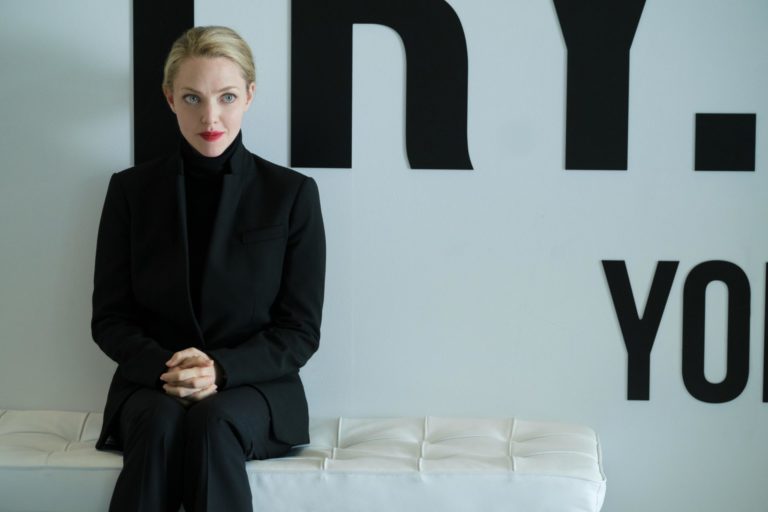
Synopsis : Money. Romance. Tragedy. Deception. Hulu’s limited series “The Dropout,” the story of Elizabeth Holmes (Amanda Seyfried) and Theranos is an unbelievable tale of ambition and fame gone terribly wrong. How did the world’s youngest self-made female billionaire lose it all in the blink of an eye?
“The Dropout” stars Amanda Seyfried as Elizabeth Holmes and Naveen Andrews as Sunny Balwani. The limited series also includes guest stars Utkarsh Ambudkar, Kate Burton, Michel Gill, LisaGay Hamilton, William H. Macy, Elizabeth Marvel, Laurie Metcalf, Dylan Minnette, Alan Ruck, Sam Waterston, Michaela Watkins and more.
The series is executive produced by showrunner Elizabeth Meriwether, Liz Heldens, Liz Hannah, Katherine Pope, Rebecca Jarvis, Victoria Thompson and Taylor Dunn. Michael Showalter directs multiple episodes and also serves as an executive producer along with his Semi-Formal Productions producing partner Jordana Mollick. The series comes to Hulu from Searchlight Television and 20th Television. This is Searchlight Television’s first production.
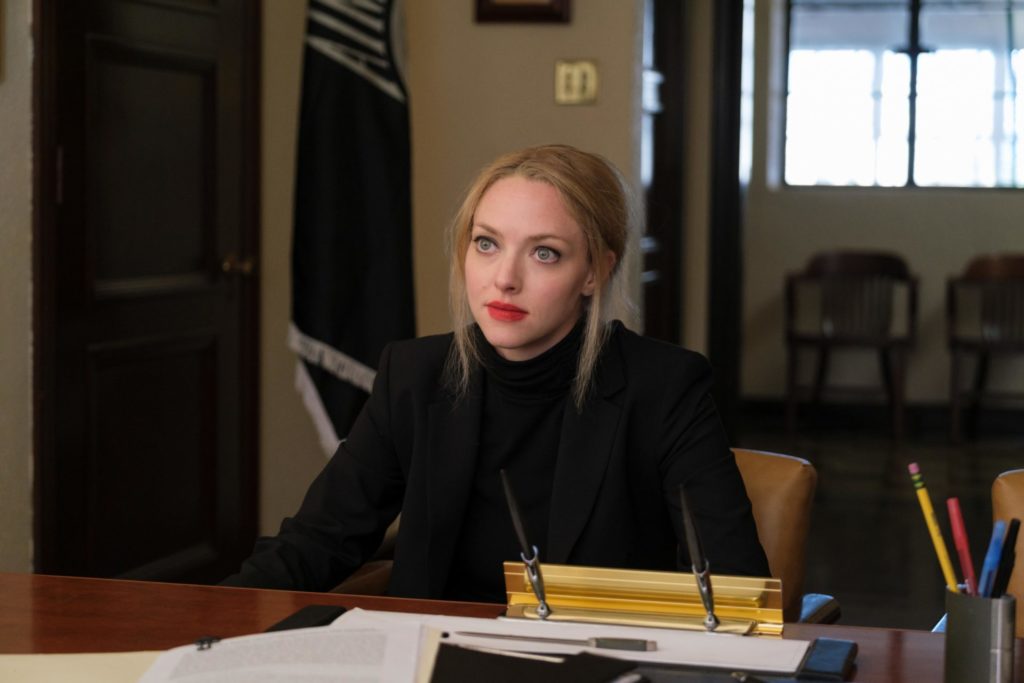
An Exclusive Interview with Director/Executive Producer Michael Showalter
Q: Elizabeth was great-great-great-granddaughter of Charles Fleischman, who founded the yeast company under his name. Her father was a vice president at Enron. She came from a very wealthy family, but she saw everything collapse. Do you think her motivation was pure, when she was learning Chinese and trying to restore her family image?
MS: Yes. I think so. I do think so. I think that’s one of the things that makes her such a fascinating character. It wasn’t as though she was taking the money and buying private jets with it or something like that. She wanted the glory. She wanted the recognition. She wanted the importance of it.
It wasn’t a financial thing, I don’t think, for her in the same way that, like a Bernie Madoff or something like that, it’s all about greed. I don’t know that greed was her motivation. I think pride — pride was a big part of it for her.
Q: The series is based on a podcast by Patricia Jarvis and ABC Audio. How much was John Carreyrou, a journalist from The Wall Street Journal, involved in the investigation? It seems at the end of the episode she was more tackling the investigation aspect of it there.
MS: That would be a question for Liz Meriwether, the writer, because I came on as the director and the scripts were there. I think a lot of that information is out there. But that’s a really good question. I don’t have an answer to that.
Q: Why did she lie about her romantic relationship with Sunny Balwani? Did she think that her image as single would sell to the investors? The relationship was also a business arrangement, so I’m curious why she kept it a secret. Was it to preserve an image?
MS: I think that’s a really good question. I think he was older than her and I think – yeah, I think that that was not good for her image, to have this much older boyfriend. I think she wanted to present herself as an unattached single person. I don’t think she wanted people to think that she had anyone influencing her or helping her make the decisions that she was making. She liked the image of herself as this sort of self-reliant kind of individual.
And I also think, even though he was very successful financially, he wasn’t “elite”. He wasn’t an elite businessperson in the way that she wanted to associate herself with – with a certain kind of caliber of person. And even though he had made a lot of money, he wasn’t actually as elite as some of the other people that she was associating with.
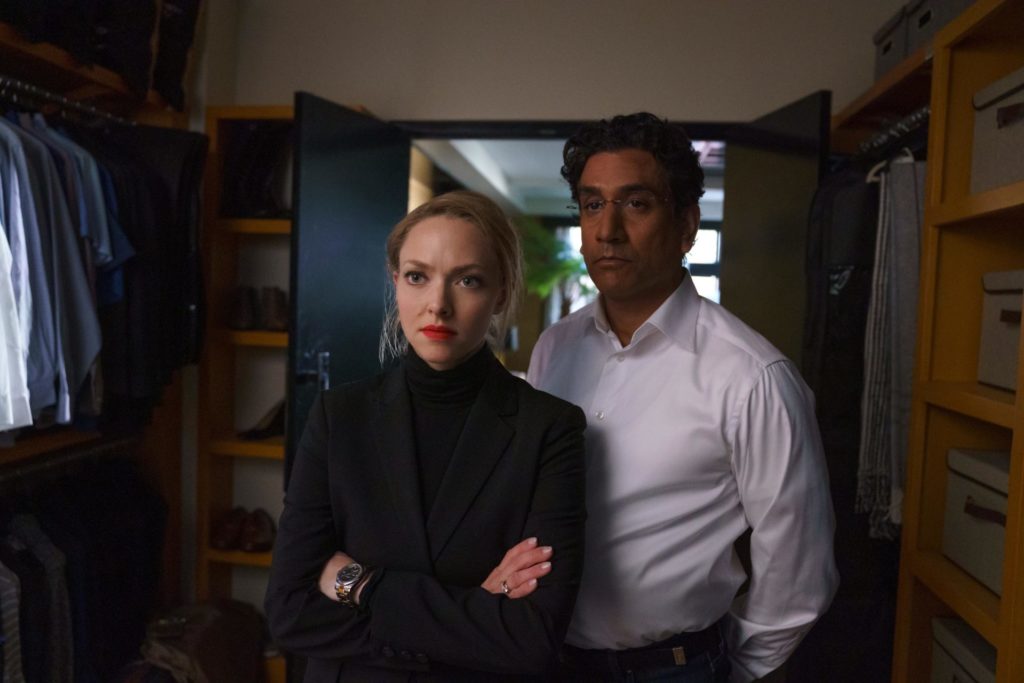
Q: She was presenting the idea of the blood-testing device when she was at Stanford with Phyllis Gardner when her father was also facing a problem with Enron collapsing. She told her father, “Don’t take Richard’s money.” Richard [Fuisz] was an investor who could help her father. But how important for you was it to establish her character as a person who never backs down in an early stage of her life?
MS: I think one of the things of this whole show is to try to understand who she was and why she may have done what she did. So I think it’s really important to establish some of the things about her before she became the version of Elizabeth Holmes that we all know, in the black turtleneck and the voice. Before all that, she was just a young woman at Stanford trying to make a name for herself.
Q: Her relationship with Stanford professor Channing Roberts was fascinating. He took her under his wing, and became a board member of Theranos. He even convinced a scientist to join. He must have known what was happening while Elizabeth was there. Why didn’t he confront her then? He was essentially her mentor, so he could have confronted her while he was on the board.
MS: Yeah. You have to remember that there was so much money to be made. And I think in the tech world, in the tech startup world, all of these great tech giants, a lot of the time they don’t have the thing they’re saying they have. But then eventually they do. We all do that. You fake it til you make it. So I think they believed her “Trust me. I’ll get it done” and they wanted it to be true.
They wanted it to be true, and I think that’s part of the story of Elizabeth Holmes and Theranos, — how much everyone wanted it to be true, including the press/media, and the public at large. We loved the story that she was selling, and everybody stood to gain. I think someone like Channing really stood to gain financially, and in terms of his legacy. So he wanted it to be true so badly that he was willing to look the other way.
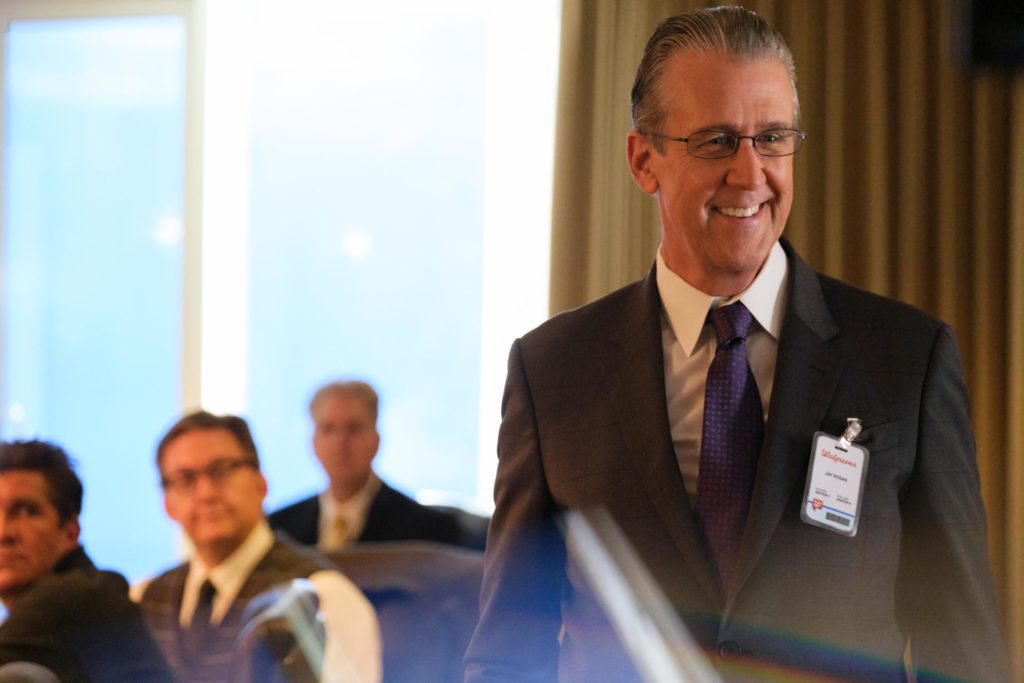
Q: You also serve as executive producer. Originally Kate McKinnon was cast, but she dropped out. So you hired Amanda Seyfried, who is really a stand-out. What was the quality that you found fascinating about her, and how did you collaborate with her on set?
MS: Oh, Amanda is an incredible actress, she’s very malleable. I think that she became Elizabeth Holmes. She absorbed all the information she was getting and all of the research that she was doing. That all came out of her, this incredible performance came out of her as a result of all that research that she had done on the character. There’s that moment at which you then turn on the camera, and she just becomes that character and she lets herself disappear into the role.
Amanda is a very fun person to work with. She’s very collaborative, she sets a great tone for everybody with her work ethic and her attitude, and I loved the experience of working with her.
Q: Elizabeth was imitating Steve Jobs, even hiring the person Jobs hired — Avie Tevanian — who joined the board later on. Anna Ariola, who designed the iPhone at Apple, also joined as a designer. They noticed something wrong in the company. So why did the co-workers stick around after those Apple people left — and continue investing their time and money there?
MS: It’s because no one wants to be wrong. No one wants to miss the boat. You don’t want to be that person who quits and then they figure it all out and then everybody makes millions of dollars. So it’s fear. It’s fear of being wrong. It’s fear of missing out. And that’s why, in retrospect, Avi and Anna looked so smart, because they actually had the courage to defect early. They saw it and they were willing to stand by it. Everyone else was afraid, and what they were afraid of was being wrong.
Q: How much did you talk to scientists or workers who were at Theranos, prior to shooting the series? There’s not a lot of camaraderie there, but at the same time, there was a lot of paranoia going on.
MS: I had one long conversation with someone who had worked at Theranos and had been there for a couple of years, and got a sense of what the culture was like. So that conversation was very helpful in terms of getting a sense of that.
And then we had — this isn’t what you’re asking, but we had a scientist on set with us every day who understood what the labs looked like so that when we were in the science rooms and the chemistry labs and the engineering laboratories, that there was some sense of authenticity about what it would look like and feel like.
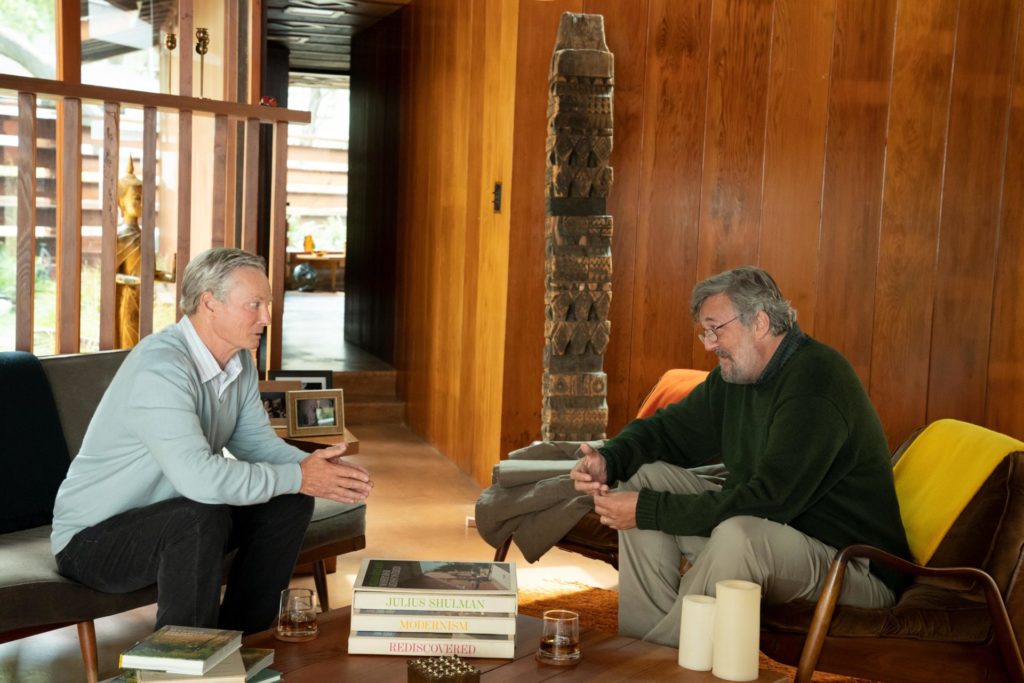
Q: It was surprising that a company like Walgreen’s signed on without seeing the laboratory, because when you think of a company like that, you would expect them to go through the process of testing and testing and testing. It didn’t make sense.
MS: Well, it’s the same thing: it’s the fear of missing out. They were afraid that CVS was going to get the technology and not them. So that’s what’s so amazing about it, is that everybody was afraid of — in retrospect, they all did see it. But they were afraid of missing out. Because what if they’re wrong and this technology does come through? And what if Elizabeth Holmes does figure it out and they missed the boat? No one wanted to miss the boat, so they held on longer and longer because they were afraid of what would happen if they left.
Q: One question I really wanted to ask: after Theranos dissolved in December 2018, do you think such blood-testing machines ever would work in the future if Theranos had survived as a company?
MS: Yes. Probably.
Q: Do you believe that? Because there are also third party machines. Some of the third-party machines are better than Theranos.
MS: Yeah. It’s a good idea. It’s a really good idea, so maybe that technology will come through at some point.
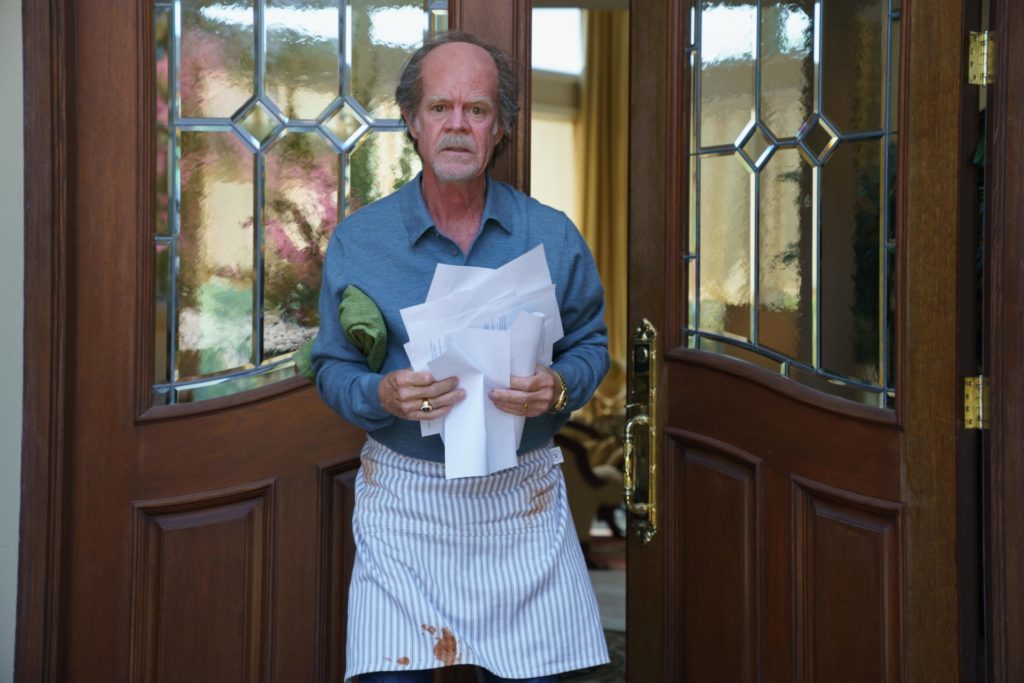
Q: What other challenges did you face in making this series? There are a lot of contract issues, the trial that was held, and other things going on.
MS: We shot the show during Covid, so that’s always s challenge, having a set when you’re trying to navigate a pandemic. It was a very ambitious shoot. Every day there was some huge scene that we were shooting with dozens of characters, and there’s something happening upstairs and there’s something happening downstairs, and there’s people outside, and there’s so much happening. There’s so much going on in the story.
There were a lot of really big set pieces, and so handling lots of background, and trying to keep things moving. Obviously, we recreated a whole sequence in Beijing which we shot in Los Angeles to make that, to create that sequence, so it was a very big show. It was a lot of moving parts, so that was challenging.
Q: This is really intriguing series when you think about the future. It’s talking about America, but also the future, investment and all those things. So what do you want the audience to take away from this series?
MS: Well, first and foremost, I think it’s a good story. It’s entertaining. It’s a very interesting story. There’s a lot of different things that can be taken away from it. Understanding Elizabeth Holmes as a character is an important part of it, and to look at what she did and to try to make sense of where she went wrong.
As you said, it’s a story about the future, and business, and the virtues of integrity and professional integrity and how important that is. We have these icons in our culture like Steve Jobs or Larry Ellison who — part of their mythology is that they also lied to get ahead. But in their cases, it worked out.
For me, a lot of it is about the trust that we put into false idols, the way in which we, as a culture, seem to fall prey to charismatic false idols. We hear this story over and over again. These stories keep happening. So I’d say it’s a cautionary tale, I suppose.
Q: Thank you very much.
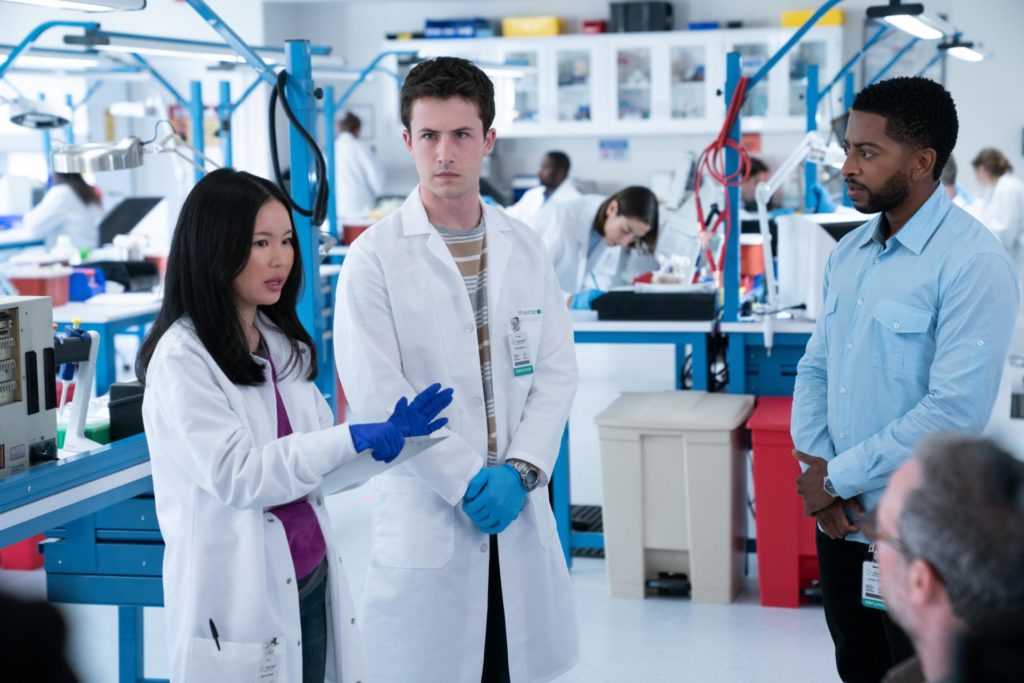
Here’s the trailer of the series.

